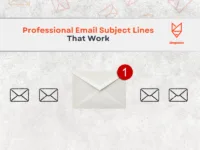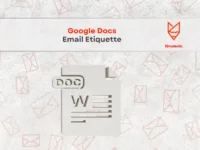Writing an angry email? Are you tired of feeling overwhelmed by anger and struggling to find the right words to express yourself? Don’t worry, you’re not alone. We all experience moments of frustration that can lead to feelings of anger and resentment. However, it’s important to remember that voicing our anger in a professional manner is crucial for maintaining healthy relationships and effective communication.
In the professional world, feeling anger or frustration is normal—but expressing it over email requires precision, restraint, and emotional intelligence. A poorly written angry email can damage your reputation, while a well-crafted one can command respect, resolve conflict, and even improve outcomes.
Angry Email Guide
Here’s how to write a professional email when you’re angry—without sounding unprofessional.
1. Don’t Write It While Angry
Pause. Take a walk, write a draft and save it, or wait 24 hours. Emotional emails written in the heat of the moment often backfire.
Pro tip: Write the email in a notes app or blank document—never address it to anyone until you’re ready to send.
2. Decide the Goal
What do you want to achieve? An apology? A correction? A refund? Clarifying your purpose helps you stay focused and direct.
3. Use a Clear, Neutral Subject Line
Avoid emotionally charged or sarcastic subject lines. Stick with:
“Clarification Needed on [Issue]”
“Concern Regarding [Project/Deadline]”
“Follow-Up on [Situation]”
4. Acknowledge the Issue Without Emotionally Loaded Language
Be honest but measured. Start with what happened:
“I’d like to address a concern regarding the recent meeting on [date].”
“I was surprised by the decision communicated in your last message.”
Avoid words like “ridiculous,” “unfair,” or “infuriating.” Use alternatives like “unexpected,” “unclear,” or “difficult to interpret.”
5. State the Impact Professionally
Explain how the situation affected you, your team, or the work:
“This change in scope has significantly impacted our delivery timeline.”
“The lack of communication created confusion among stakeholders.”
6. Ask for Specific Actions or Clarifications
Now that you’ve stated the concern, guide the reader to resolution:
“Can we revisit the deadline or clarify expectations moving forward?”
“I’d appreciate a response clarifying how decisions will be communicated in the future.”
7. Stay Respectful and Solution-Oriented
Always keep the tone forward-focused:
“I’m committed to resolving this and ensuring we move forward collaboratively.”
“I value our working relationship and hope we can address this constructively.”
8. End on a Controlled, Professional Note
“Looking forward to your response.”
“Thank you for taking the time to review this.”
“Please let me know a convenient time to talk.”
What to Avoid at All Costs
- ALL CAPS or exclamation points!!!
- Sarcasm (“Thanks for making my job impossible”)
- Personal attacks (“You always do this”)
- CC’ing half the company out of spite
- Passive-aggressive jabs (“Clearly this was not a priority for you”)
Sample Template: Professional Angry Email
Subject: Concern Regarding [Project/Topic]
Hi [Recipient’s Name],
I’d like to bring up a concern regarding [brief description of issue]. The recent [event/decision/action] has caused confusion and disrupted our team’s ability to proceed as planned. While I understand that there may have been reasons behind this change, the lack of communication and clarity has created challenges in meeting our objectives. Could we schedule a time to discuss how we can better align on expectations and ensure smoother coordination going forward? I’m committed to resolving this constructively and continuing our collaboration. Thank you for your attention to this.
Best regards, [Your Name]
Professional alternatives
Next we will explore a list of words commonly used to express feelings angry email and provide you with “professional” translations. These alternatives will help you convey your thoughts and emotions in a more composed and respectful manner. So, whether you’re dealing with a difficult colleague, experiencing customer dissatisfaction, or facing personal challenges, this guide will equip you with the tools to express your anger professionally. Ready to enhance your communication skills and master the art of expressing anger professionally?
- Original: “This is absolutely ridiculous!”
Professional: “This situation is highly concerning and requires immediate attention.” - Original: “I can’t believe how incompetent you are!”
Professional: “It appears that there may have been some miscommunication or misunderstanding. Let’s work together to address the issue.” - Original: “You never listen to me!”
Professional: “It seems that there may have been a breakdown in communication. I would appreciate the opportunity to share my thoughts and concerns.” - Original: “This is a complete disaster!”
Professional: “It seems that there are significant challenges that need to be addressed promptly in order to ensure success.” - Original: “You always make mistakes!”
Professional: “I have noticed some errors in the work recently. Let’s discuss strategies to improve accuracy moving forward.” - Original: “I’m so fed up with this nonsense!”
Professional: “I believe there are areas that require further attention and improvement. Let’s discuss how we can address these issues.” - Original: “You’re driving me crazy!”
Professional: “It seems that we have differing perspectives on this matter. Let’s find a common ground to move forward.” - Original: “I have never seen such incompetence!”
Professional: “It appears that there may be some challenges in meeting the desired expectations. Let’s work together to find solutions.” - Original: “This is an absolute nightmare!”
Professional: “It appears that we are currently facing significant challenges. Let’s come together to find a resolution.” - Original: “You’re always causing problems!”
Professional: “I have noticed some issues arising from our collaboration. Let’s address them and find ways to improve our working relationship.” - Original: “I can’t believe how unprofessional this is!”
Professional: “I have concerns regarding the level of professionalism in this situation. Let’s strive for a higher standard moving forward.” - Original: “You’re impossible to work with!”
Professional: “I believe that we may have differing working styles. Let’s find ways to collaborate more effectively.” - Original: “This is a disaster waiting to happen!”
Professional: “I have identified some potential risks that need to be addressed to ensure a successful outcome.” - Original: “I’m sick and tired of your excuses!”
Professional: “I believe it is important that we take responsibility for our actions and seek solutions rather than making excuses.” - Original: “You’re always messing things up!”
Professional: “I have noticed some areas where improvements can be made. Let’s discuss strategies to enhance our performance.” - Original: “I’m furious about this!”
Professional: “I am deeply concerned and believe that urgent actions are needed to rectify the situation.” - Original: “You’re never available when I need you!”
Professional: “I have noticed challenges in aligning our schedules. Let’s find a way to improve communication and availability.” - Original: “I can’t believe the level of incompetence here!”
Professional: “I have concerns about the current level of performance. Let’s work together to improve processes and outcomes.” - Original: “You’re always making things more complicated!”
Professional: “I believe there may be opportunities to simplify processes and enhance efficiency. Let’s explore these possibilities.” - Original: “This is a complete waste of time!”
Professional: “I have reservations regarding the value that this activity is providing. Let’s reevaluate and determine if adjustments are needed.” - Original: “You’re driving me up the wall!”
Professional: “I believe there may be some challenges in our alignment. Let’s find ways to improve our collaboration and understanding.” - Original: “I can’t deal with your incompetence anymore!”
Professional: “I have observed some areas where improvements could be made. Let’s work together to address these concerns.” - Original: “This is an absolute travesty!”
Professional: “I believe that there are significant issues at hand that require urgent attention. Let’s work together to find solutions.” - Original: “You always manage to mess things up!”
Professional: “I have noticed some challenges in the outcomes achieved. Let’s discuss strategies to improve our performance.” - Original: “I’m so frustrated with your lack of ability!”
Professional: “I have concerns about the current level of performance. Let’s explore ways to enhance our abilities and skills.” - Original: “You’re constantly causing problems!”
Professional: “I have observed some issues arising from our collaboration. Let’s address them constructively and find resolutions.” - Original: “I can’t believe how unorganized this is!”
Professional: “I have identified some areas where improvements in organizational processes could enhance our efficiency.” - Original: “You’re making my job impossible!”
Professional: “I believe that there may be some challenges in our collaboration. Let’s find ways to work together more effectively.” - Original: “This is an absolute nightmare!”
Professional: “I believe that we are currently facing significant challenges. Let’s work together to find resolutions and create a more positive outcome.” - Original: “I’m so tired of your incompetence!”
Professional: “I have noticed a few areas where improvements can be made. Let’s discuss strategies to enhance our abilities and performance.” - Original: “You’re driving me insane!”
Professional: “I believe there may be some challenges in our working relationship. Let’s find ways to collaborate more effectively.” - Original: “I can’t believe how unprofessional you are!”
Professional: “I have concerns regarding the level of professionalism in this situation. Let’s strive for a higher standard of behavior and conduct.” - Original: “You’re impossible to work with!”
Professional: “I believe that we may have different working styles. Let’s find ways to enhance our collaboration and understanding.” - Original: “This will end in disaster!”
Professional: “I have identified some potential risks that need to be managed and addressed to ensure a successful outcome.” - Original: “I’m sick and tired of hearing excuses!”
Professional: “I believe it is important for us to take accountability for our actions and find solutions rather than making excuses.” - Original: “You always make a mess of things!”
Professional: “I have noticed some areas where improvements can be made. Let’s discuss strategies to streamline processes and improve outcomes.” - Original: “I’m enraged about this!”
Professional: “I am deeply concerned and believe that immediate actions are necessary to address the situation effectively.” - Original: “You’re never accessible when I need you!”
Professional: “I have observed challenges in aligning our schedules. Let’s find a solution that improves communication and ensures accessibility.” - Original: “I can’t believe the incompetence exhibited here!”
Professional: “I have concerns about the current level of performance. Let’s work together to improve processes and achieve better outcomes.” - Original: “You’re always complicating matters!”
Professional: “I believe there may be opportunities to simplify processes and enhance efficiency. Let’s explore ways to streamline our work.” - Original: “This is a complete waste of time and effort!”
Professional: “I have reservations regarding the value that this activity is providing. Let’s reevaluate and determine if adjustments are necessary to maximize productivity.” - Original: “You’re driving me up the wall with your actions!”
Professional: “I believe there may be some difficulties in our alignment. Let’s find ways to enhance collaboration and understanding.” - Original: “I can’t deal with your consistent lack of ability!”
Professional: “I have concerns about the current level of performance. Let’s explore ways to enhance our skills and capabilities.” - Original: “You always seem to mess things up!”
Professional: “I have noticed some challenges in the outcomes achieved. Let’s discuss strategies to improve our performance and results.” - Original: “I’m so frustrated with your lack of talent and skill!”
Professional: “I have concerns about the current level of performance. Let’s explore ways to enhance our abilities and skills for better outcomes.”
Remember, expressing your anger doesn’t mean suppressing it or pretending it doesn’t exist. Instead, it involves finding constructive ways to communicate your frustrations without causing harm or escalating a situation.
[table id=1 /]An angry email can become a powerful tool for accountability and change—if handled with control, clarity, and professionalism. Think of it as an opportunity to lead with grace, even when you’re fuming inside.




